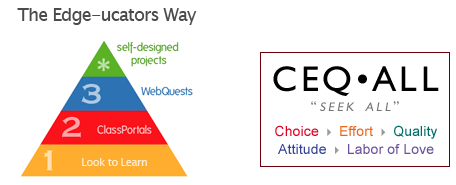A prestigious group of educators are convening at the Intercontinental Hotel in Sydney’s CBD on the 16th and 17th of this month to share strategies for improving learning achievement through differentiation.
I have the pleasure of presenting the opening presentation on day 1. I will begin with a personal narrative illustrated with differentiated designs I’ve been involved with and then present a case of what’s needed in education circa 2016. This post includes links and resources that I’ll refer to during the talk captured in this blurb:
Design for the Big Win: Differentiation and Beyond
Traditional models of schooling come up short when viewed through the lenses of current technologies and pedagogies. Rather than rely on habit or following trends, leading educators can choose to design a better way based on their values and personal skillsets. This presentation highlights how we can use more effective and rewarding models to design the schools we really want.
Links, Examples and Resources
Tom’s Models
- Tom’s WebQuests Page
- The Learning Power of WebQuests, Tom March, Educational Leadership, Volume 61 | Number 4
- Better: What WebQuests Are (Really), Tom March (complete version of Ed Leadership article)
- WayBack Machine’s grab of BestWebQuests
- Schools: Invent The Next Era Of Education, Tom’s overview for the graphic below
- C E Q • A LL (“seek all”) = Choice – Effort – Quality • Attitude – Labor of Love (Lifelong Learning)
Readings & Pedagogies
- “The 2 Sigma Problem: The Search for Methods of Group Instruction as Effective as One-to-One Tutoring”, Bloom, B. (1984).
- Personalization and the 2 Sigma Problem – Arthur VanderVeen, Edsurge
- Self Determination Theory – Deci & Ryan et al.
- Overview
- Explore the Research
- Daniel Pink’s Animation
- Why We Do What We Do – the sourcebook
- See the Resource list / links for Integrating 5 Great Pedagogies in an earlier post by Tom
Scaffolded Learning Software
- Thesis Builder – early and enduring scaffold for drafting persuasive essay thesis statements and outline.
- Web-and-Flow – 1999 eLearning creator for teachers
- Summit Personal Learning Platform – by Facebook & Summit Public Schools
Cool Tools
- Wordsift – my favourite word cloud builder
- PollDaddy – view the poll on “typical occurrences at your school”






 How great to be back in Perth! I’m really pleased to return to the ECAWA conference to see old friends and meet new ones. During the conference I’ll be presenting:
How great to be back in Perth! I’m really pleased to return to the ECAWA conference to see old friends and meet new ones. During the conference I’ll be presenting:








 This Sunday and Monday brings a quick trip to Perth where I get to work with The Western Australian Secondary Teaching Administrators’ Association. It’s a particular honour to share my thinking here because the audience are Level 3 educators, meaning they are “exemplary teachers recognised and rewarded for their exceptional teaching practices.” I’ll present a variation of the
This Sunday and Monday brings a quick trip to Perth where I get to work with The Western Australian Secondary Teaching Administrators’ Association. It’s a particular honour to share my thinking here because the audience are Level 3 educators, meaning they are “exemplary teachers recognised and rewarded for their exceptional teaching practices.” I’ll present a variation of the 
